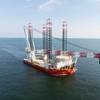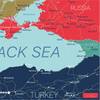Jobs Available Here!
The tragic near-sinking of the Costa Concordia in Italy has the world’s attention riveted on the safety of cruising, the condition of cruise ships, and the training and experience of cruise captains. That’s just the way things work: tragedy focuses attention and perhaps reform.
We saw the same thing happen in Minneapolis in 2008 when the I-35 bridge collapsed and lives were lost. Bridge safety became a priority in Washington, DC and for the nation. And the Federal government provided the funding on an immediate basis to rebuild the bridge!
While the catastrophic collapse of a lock and dam may not impact human life to the degree these two tragedies did, our nation’s waterways navigation system is in danger of just such a breakdown that will surely affect our fragile economy.
According to recent Army Corps of Engineers’ data, 58% of the locks and dams on the waterways system in the United States have outlived their 50-year design life. The commercial operators of the system and shippers know this to be true when routine, scheduled closures are now equal to unscheduled, emergency closures across the system.
Something must be done to recapitalize this critically important infrastructure that returns a multitude of benefits to the American economy and to our overall quality of life.
One of the most important advantages the waterways provide is family-wage jobs; the economy, our prosperity, and jobs remain the priority for our nation and for its recovery.
Waterways Council is concerned with jobs as well, and through its Inland Waterways Capital Development Plan, which we are hopeful will be moving through Congress at press time, offers a way to put American workers back to work building locks and dams. In fact, there are currently more than 25 navigation projects already authorized by Congress that could begin employing U.S. workers over the next two decades. That is $8 billion in authorized but unfunded projects ready to go! The most important advantage our waterways can bring to America is these family-wage jobs. An investment in our nation’s lock and dam system today will surely provide for a more prosperous tomorrow.
Increasing our exports will also grow our economy, and as the expanded Panama Canal readies to open, shippers are preparing for increased product demand. U.S. waterways and ports need to be ready, too, in order to provide connectivity for the Canal.
America’s inland waterways system is like the silent workhorse of our country’s export market, transporting about 50% of grain and oilseed exports by barge (2009 statistics). Domestically, it is vital as well, moving 20% of utility coal (inland and coastal) and 15% of petroleum movements by water (inland and coastal). Countless aggregate materials are also moved on the inland rivers for everything from housing construction to sand and salt for keeping our roads safely open in winter.
At press time, industry should learn the amount of a cost over-run of the Olmsted Lock and Dam project on the Ohio River. Originally authorized under the Water Resources Development Act (WRDA) of 1988 at a cost of $775 million, the Corps of Engineers has warned of a “significant” cost increase above the already current estimate of $2.1 billion. The inland waterways industry pays for half of the cost of this project -- and the many over-runs -- through a 20-cent- per-gallon fuel tax that goes into the Inland Waterways Trust Fund (IWTF). (*)
The Olmsted project is yet another example of why the present business model to complete navigation projects is, like the lock and dam system overall, broken.
So as Congress returns to the nation’s capital, let’s urge them to get to work by passing the Inland Waterways Capital Development Plan and putting American workers back on the job.
(*) Cost over-run has since been release by the USACE to be $800 million.
by Michael Toohey, President & CEO, WCI, Inc. (taken from the February print edition of MarineNews magazine)












